The idea of making a live-action Pokémon must have been on many minds for years, but it took the combination of Legendary Pictures working with director Rob Letterman (Goosebumps) and the Pokémon Company to make it happen. Based on the “Detective Pikachu” video game, the game’s high concept is taken one step further by having that title Pikachu voiced by the one and only Ryan Reynolds.
The story revolves around Justice Smith (Jurassic World: Fallen Kingdom) as Tim Goodman, a young man whose detective father has died under mysterious circumstances, so he travels to Ryme City, where humans live side-by-side with their Pokémon pals. Tim instead finds his father’s Pikachu (that one voiced by Reynolds) and the two of them try to solve the mystery of what happened and how it ties to a deadly Mewtwo.
For Rob Letterman, making a live-action Pokémon movie would mean putting all of his skills from doing animation and other CG-heavy live action movies into creating a Pokémon movie that could appeal to new fans of the games and older ones.
The Beat got on the phone with Letterman last week to discuss how he did this, and yeah, we brought up Sonic the Hedgehog.
(Also, don’t forget to check out Heidi MacDonald’s review!)
THE BEAT: I’d heard about Detective Pikachu while it was in production as various things came out, but I never thought it would work until I saw it for myself. At what point in development did you get involved with it or were you there very early on?
Rob Letterman: Well, let’s see… so Legendary had gotten the option to make it from the Pokémon Company, the producers – Mary Parent, Cale Boyter – had been chasing it for years, even before they went over to Legendary. They got the option for the “Detective Pikachu” game, which was in development to be turned into the first live action Pokémon movie, so I got involved after they had the rights and it was all settled in, then they reached out to me, and I jumped on board ‘cause my kids are huge Pokémon fans. Huge.
THE BEAT: As are most kids…
Letterman: Most kids, right, totally. Not just mine. It was that, and there’s a really sweet human story baked into that Detective Pikachu character, so the combination of those two things was amazing.
THE BEAT: I haven’t played the game, so is the game like a puzzle-solving game? What’s the gameplay and story like?
Letterman: Even I haven’t played the game. We were working in parallel. Yeah, it’s a very simple game for kids, a puzzle-solving thing. It had this really interesting human story to it, and it just made a lot of sense to adapt into live action and just the notion of Ryme City and Pokémon everywhere, being like the familiars to their human partners. There’s a lot of elements of this little game that just made a lot of sense for a movie.
THE BEAT: Was there any influence from the cartoons or card aspect of the game or other games or was it really just that one game you wanted to explore?
Letterman: No, it’s everything because it’s the game, just the basic building blocks of the game for the story. Detective Pikachu is just the big tough guy personality of this little adorable character and the ability that only Tim can hear him, that’s drawn directly from the game. That was all the conceit of the game, but from there, we wanted to make sure it connected into the overall Pokémon Universe, so we built connective tissue, bridge points, Easter eggs, references to the other regions in the Pokémon Universe. Mewtwo, which is in the Detective Pikachu game gave us a doorway into the rest of the Pokémon storylines, because Mewtwo is such a big character. Mewtwo was in the first Pokémon movie, and that allowed us to basically tie into the overall Pokémon mythology.
THE BEAT: At what point did you get Ryan Reynolds to voice Pikachu and come up with that concept to have his voice be Ryan Reynolds, who has become more known for his R-rated comedy in recent years? Was this even before Deadpool? How long ago was it?
Letterman: When Ryan came on? He was still doing Deadpool 2, and we were looking for that big voice out of that little character, someone who is hilariously funny but also could be very dramatic emotionally and have a lot of heart. That narrows it down, but we did a test. You can’t audition someone like Ryan Reynolds, so we took a clip from The Change-Up, one of his older movies that you wouldn’t think twice about. Well, we took a clip from that and animated Pikachu to that clip just to test it. This is all before we approached him. It was like magic. It just popped! It’s hard to explain. Once the voice came out of that little character, that was it. It had to be Ryan, and then we chased him down.
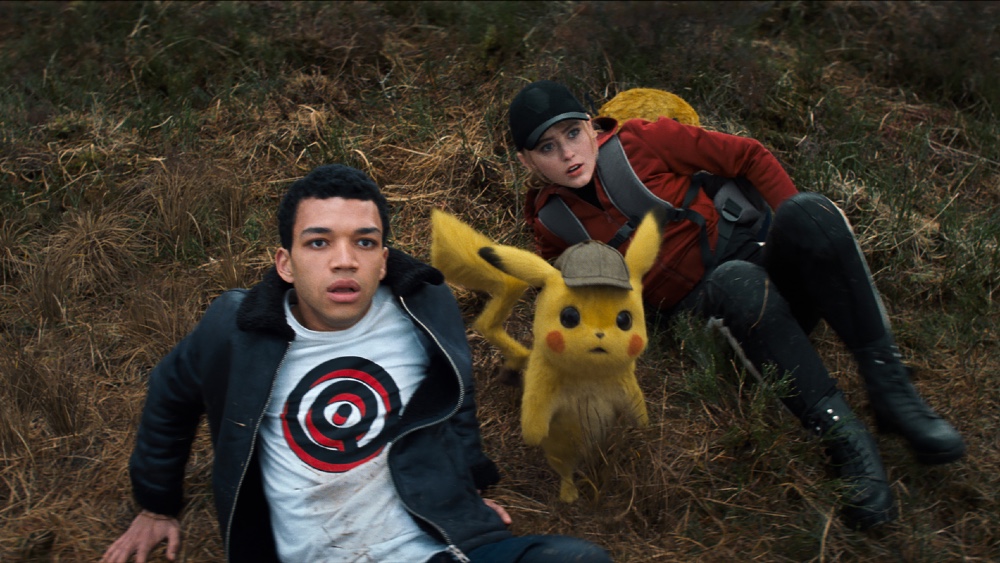
THE BEAT: I saw him on TV this morning talking about it, and this was always going to some sort of mocap thing where you can capture his performance on set and then animate to that? Or was there still stuff he had to voice? What was the concept of making it work?
Letterman: It was really complicated. It was sort of all of the above. The mocap part, it was like a “dirty mocap.” It’s not Avatar by any stretch. It was a headgear piece, so it’s only the face really, and we had witness cameras on Ryan to get his performance. His superhero build isn’t a 1:1 with that Pikachu body, so we captured the face. We did a lot of rehearsals with Ryan, just to get the chemistry right between him and Justice, get Ryan’s voice in it. Let him rework all of the dialogued, so it suited him and get access to his brilliant comedic brain on it. And then, we basically ran the whole movie as a stage play just before we started shooting, a couple days before the first day of shooting. Ryan wore the headgear, and we had a bunch of video cameras all around to make sure we recorded everything. We just ran through the movie with Ryan, Justice, Katherine Newton, a mime and formed it like a piece of theater and workshopped it and recorded all that. Then we had Ryan on set for the first four days of shooting. It was really difficult for Justice… he needed Ryan there to make this a natural performance, so we pulled out the scenes in the apartment and the coffee shop, the Hi-Hat Café, and put them up in the schedule, so that we could have Ryan on set for that and start to establish the rhythm of it. So Ryan would stand just off-camera by me and act with Justice, even though Justice’s eyeline was on a puppet or a tennis ball or a stick. We just got into the rhythm of that, and then when Ryan left, it was in Justice’s muscle memory by then. We had a stand-in read lines with Justice and then that got us through the shoot. After that, as we were editing the movie and things were changing and evolving, we went back to Ryan with the headgear, chased him around all parts of Europe and Abu Dhabi. Wherever he was shooting a movie, I would just show up with a microphone and that crazy headgear and record lines. It was a wild process.
THE BEAT: Is there any footage of Ryan with his head on Justice’s shoulder doing lines like that? Or did he not go that far?
Letterman: There is an entire basically stageplay of those guys running the movie in a big recording suite. Someone has it. There’s tons of video of that.
THE BEAT: Was most of Ryme City built on a soundstage or did you have parts that you shot in Japan or other places?
Letterman: It was all shot in London. The movie is all shot on film. It’s all location-based or in-camera sets that were built. There’s very little green screen in it, and it was all shot in London, Scotland and Ryme City in particular, the design was a mash-up of London, New York and Tokyo… Shinjuku, Tokyo specifically. We would set-dress our streets a little bit with signs, and then the rest we would digitally extend. We added buildings and put all the signage in just to give it that East meets West vibe.
THE BEAT: Did you have a choice of Pokémon that you could use in the movie? How was it decided which Pokémon to use and were there any where they just said, “No, you can’t use that one.”
Letterman: It was a combination of a lot of things. The Detective Pikachu game had a certain set of Pokémon that are baked in, so we started with that. And then, there’s fan favorites. The first generation of Pokémon characters, that was important, because we wanted to make sure that this was a movie for people who grew up on Pokémon who are now in their late 20s, early 30s, as well as the new generation of Pokémon fans. That was a whole set, and then we worked really closely with the Pokémon Company throughout the whole process to make sure it was authentic from a story standpoint and the design of the Pokémon characters standpoint. We went through the list with them, and then Erik Nordby, our visual FX supervisor and myself, kinda combed through it ourselves to pull out the ones we thought we could do a really good job with in a photo-real CGI world. It was all those factors combined.
THE BEAT: I’m sure you must have heard what is going on with the Sonic the Hedgehog thing going on right now with the design. I think Pikachu looks adorable as do the other Pokémon, but were there any worries about that kind of thing where you might have to do changes to make them work in the 3D environment?
Letterman: You mean after the fact?
THE BEAT: Not after the fact, but just knowing that some people will see your design of Pikachu and how it looks different from what they’re familiar with.
Letterman: We were very… we put a lot of care and thought. We worked for a year designing the characters before we even started shooting. We went back and forth to Tokyo, we worked with the original creators. Ken Sugimori, who drew Pikachu in the first place, oversaw all the concept art. We sent it back and forth, got all his notes. I had Pikachu on my laptop in grey scale, black and white, as we were putting it together, and I flew to Tokyo and presented it to the President of the Pokemon Company, Mr. Fujihara, and Ken Sugimori, the original artist who drew it, and presented it and got all the feedback and their blessing for it. There was just an enormous amount of work, time, care, by a lot of people to get the character right before we started shooting, and get it right so that the fans will appreciate it. The best way to do it is just work with the original designers, and that was our approach.
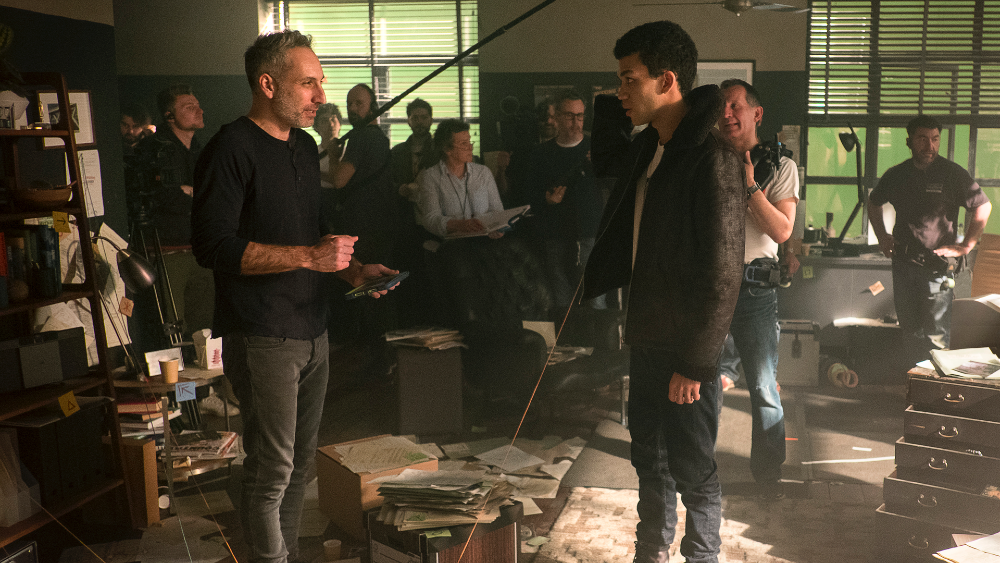
THE BEAT: I’m not sure how old your kids are but did you have them for a test audience while you’re making your movies? Do you show them bits and pieces to get their reaction or are they too young?
Letterman: No, I don’t show it. My daughter still hasn’t seen it. My wife saw it last night for the first time. My son kind of has seen it, because there was a day during spring break we didn’t know what to do with him, so he came to work with me. He saw it in its rough form, but no, it’s my own neurotic issues that I don’t show it to my family. (laughs)
THE BEAT: What do you think of what’s happening with Sonic the Hedgehog? Do you think you’d ever be at that point where you show a teaser, for any of your movies, and then had to do changes due to fan reaction?
Letterman: I don’t even want to go there. Everybody makes movies differently. There’s no right or wrong way to doing any of this stuff. I can just say for us, we couldn’t be in that situation. We had to have it all done. We just put so much time into it. We were working very hard to nail the line drawings of the original Pokémon, and if we were off by an inch, to change it after the fact would just throw off all of Justice Smith’s performance. For us, we couldn’t have done it. That doesn’t mean that they can’t. It’s different for every movie.
THE BEAT: You didn’t do the sequel to Goosebumps, so do you have any interest to do a sequel to this one? I’m assuming it will do really well all over the world.
Letterman: Don’t jinx it, man!
THE BEAT: It’s always weird doing interviews before a movie is released. You always want to do it after it’s been out for a few days.
Letterman: Listen, I would love to do a sequel, and I’m very superstitious, so I’m slightly terrified. The truth is the studios – and it’s very flattering, they’re very bullish on it, so they did hire a writer to start development on it – but the truth is that the movie has to do well. I mean, that’s just how these things work, so honestly, we won’t know for another week or two. If Avengers leaves any money in the banking system. If there’s anything left, we may have a chance.
THE BEAT: My biggest issue with the movie, and you have to understand that I’m a fan of the cartoon series, more than any of the games… but not having Team Rocket in the movie. That’s the one issue I had. I was so hoping they’d at least show up in the end credits.
Letterman: Listen, if the movie does well, we’ll help you out.
THE BEAT: Just throwing this out there but I think Zac Efron and Aubrey Plaza would be the perfect Team Rocket James and Jesse.
Letterman: Zac Efron and who? Oh, I love Aubrey Plaza. That’s cool!
THE BEAT: And they’ve worked together before, too, so I’m just throwing it out there.
Letterman: If they turn out to be cast in some future version with Team Rocket, you’ll get the exclusive.
There, you have it. It’s on the record!
Pokémon: Detective Pikachu opens nationwide on Thursday night, May 9.
[This interview has been edited for length and clarity.]


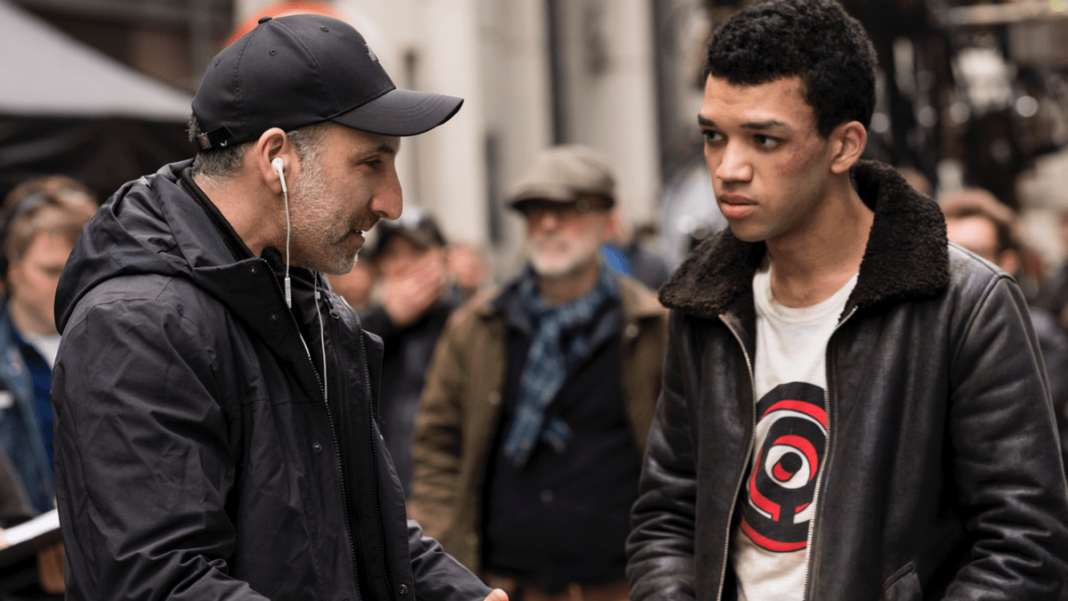
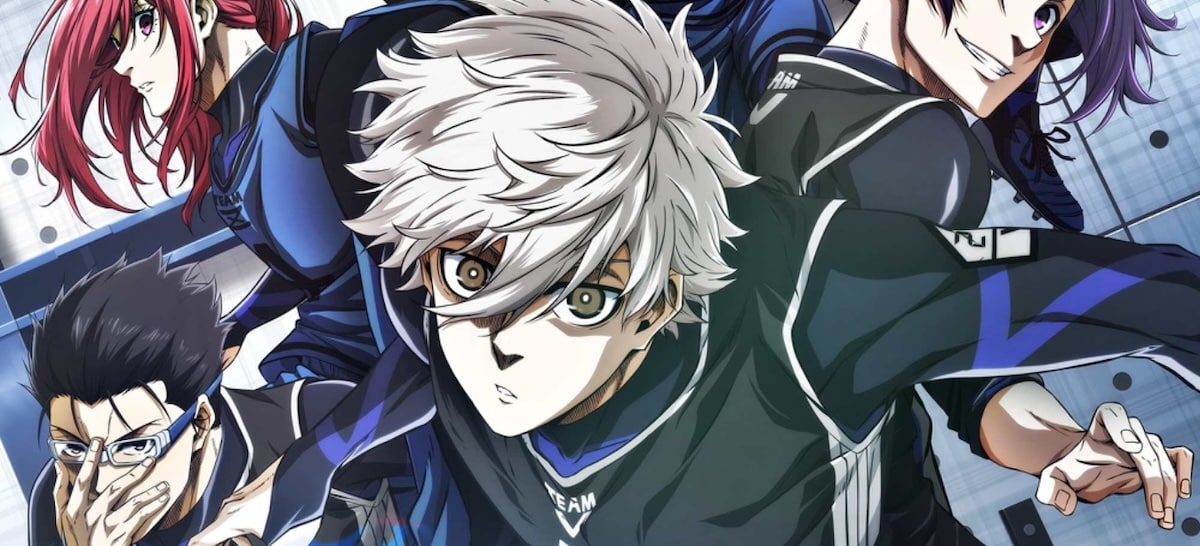

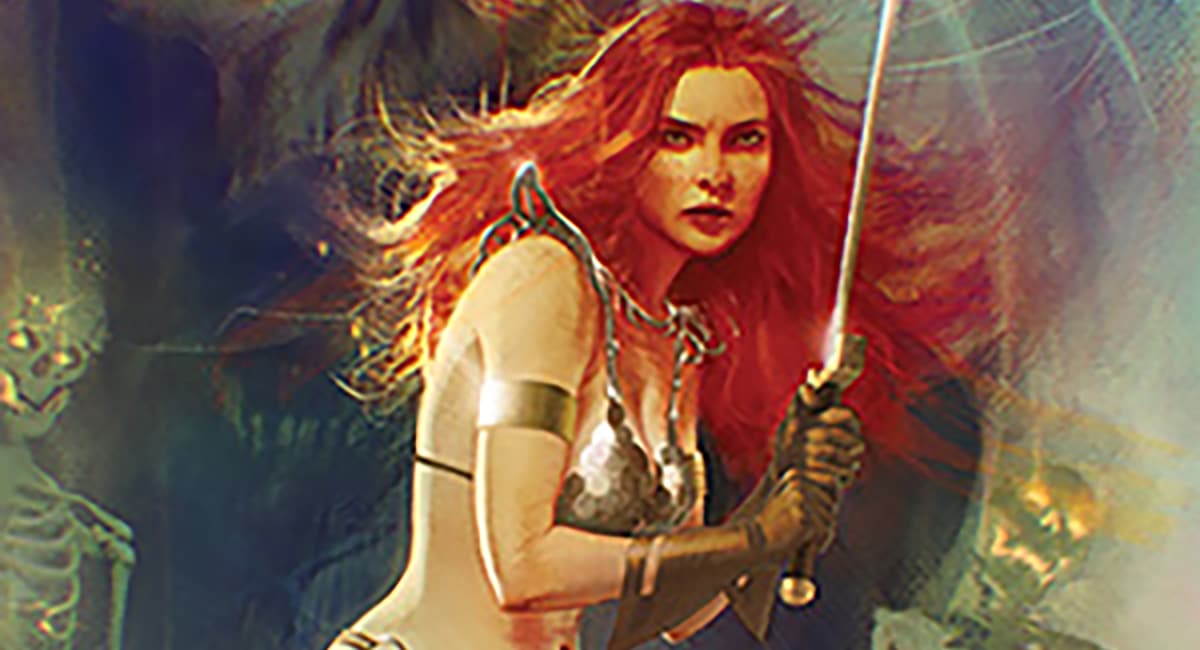


Comments are closed.